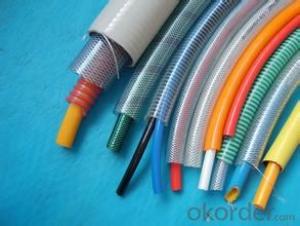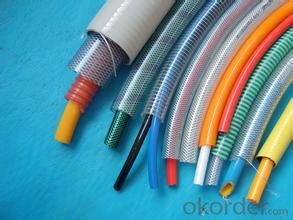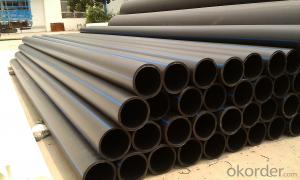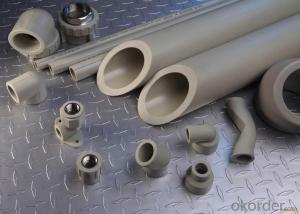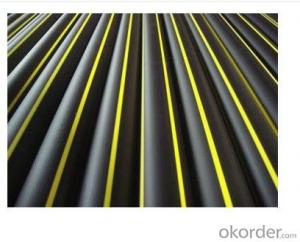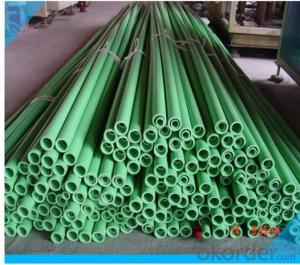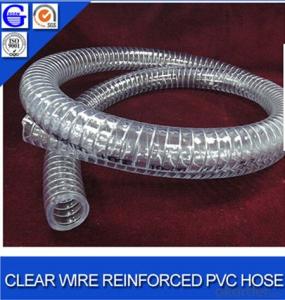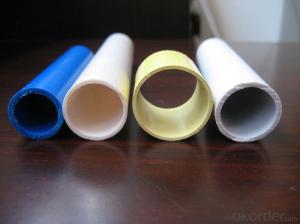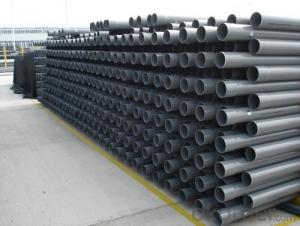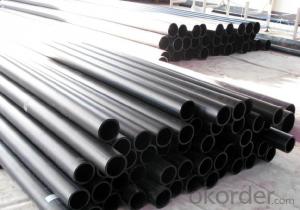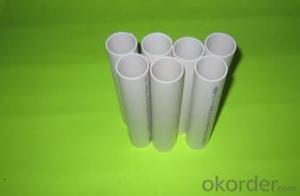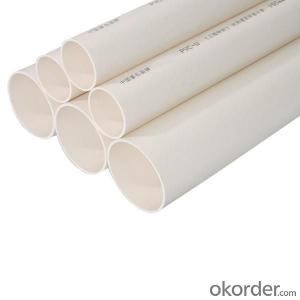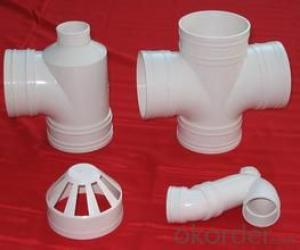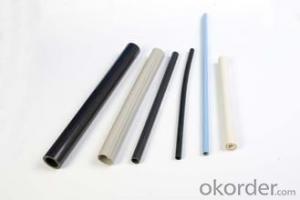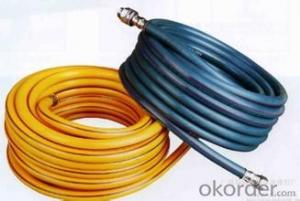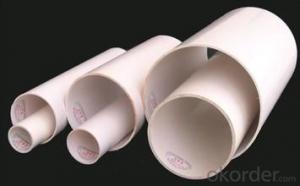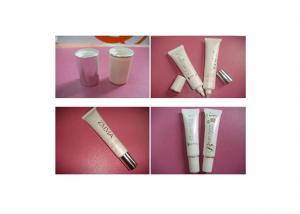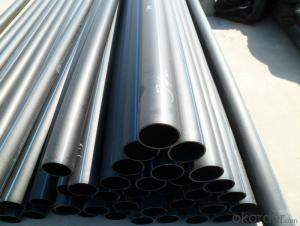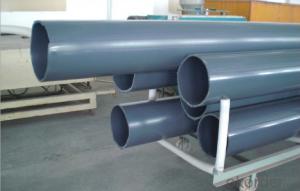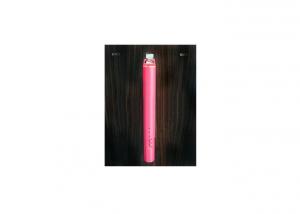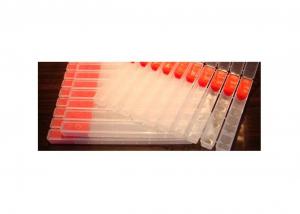Plastic Tubes - PVC Pipe Smooth Interior Walls Material PVC, Specification:16-630mm, Length:5.8/11.8m, Standard:GB
- Loading Port:
- Tianjin
- Payment Terms:
- TT OR LC
- Min Order Qty:
- 1 m
- Supply Capability:
- 9999 m/month
OKorder Service Pledge
OKorder Financial Service
You Might Also Like
Quick Details
Place of Origin: Beijing, China (Mainland) Material: PVC Specification: 16-630mm Length: 5.8/11.8M Standard: GB
Packaging & Delivery
Packaging Details: coils in plastic bag
Delivery Detail: 15- 20 days
Specifications
PVC Pipe
1,16-630mm;
2, Wall thickness:1.6mm-26.7mm;
3, Pn:0.63-2.0MPa;
4, Length:5.8/11.8M
Features:
**Sizes: 16 to 630mm
**Pressure Rating: 0.6MPa, 0.8MPa, 1.0MPa, 1.25MPa, 1.6MPa
**Colors: white, grey, red or other colors on request
**Connection: socket fusion joint
**Standard: GB
**Certification: ISO9001, ISO14001
**Packaging: coils in plastic bag or as your request
Advantages:
**Corrosion Resistant: resist chemical matters or electron chemical corrosion
**Higher Flow Capacity: smooth interior walls result in lower pressure loss and higher volume than metal fittings
**Lower Installation Costs: light weight and ease of installation can reduce installation costs by as much as 50% over metal fittings
**Longevity: more than 50 years under proper use
**Environment-friendly: PVC-U drainage fittings can be recycled
Application
water pipe network system, industrial liquids transportation, Agricultural irrigation pipe and sewage treatment
- Q: How are plastic tubes labeled with barcodes?
- Plastic tubes are labeled with barcodes using various methods such as adhesive labels, direct printing, or laser etching. These barcodes typically contain information such as product details, batch numbers, or tracking codes, allowing easy identification and management of the tubes throughout their lifecycle.
- Q: Plastic tube how to link three links?
- You can do it yourself. Remember, in the pipe connection, the best combination of the use of fine shar slightly hit point, glue after 12 hours don't try.
- Q: My bridge had broken and I got someone to make me a new one, but when I reviewed it over, I noticed they moved the plastic tube to the bottom of the violin. Should I not worry about it or have someone fix it?
- Does the bridge have a protective cover glued to it under the string - it's called a parchment? Or does the bridge have an insert in it, usually made from Ebony? If either of these is a yes, you don't need the tube. If the answer was no to both, the tube should probably be there to protect the bridge from the string cutting in. Here is a pic of the two possibilities I've mentioned.
- Q: Owner of Toyota Corolla 95 4AFE: What do you call the (rubber/plastic) tube connecting the air filter to the engine?
- It's the air inlet tube
- Q: Is there an easy way to remember the color tubes (phlebotomy) and what test they are needed for?
- Phlebotomy Tubes Colors
- Q: Can plastic tubes be used for display signage?
- Yes, plastic tubes can be used for display signage. They are versatile, lightweight, and can be easily customized to fit different sizes and shapes. Additionally, plastic tubes are durable and weather-resistant, making them suitable for both indoor and outdoor use.
- Q: Is the PPR plastic pipe really poisonous? Is the news true?
- PPR pipe is a hotbed of bacteria to multiply shelter evil people and countenance evil practices, the. The pipeline industry of PPR tap water pipe internal dirt sampling in use after a period of time, the detection result is: a yellow rust tumor, containing bacillus, coccus, fine shaped bacteria, bacteria, Escherichia coli, Ehill intestinal bacteria and bacteria, not dwelling rod bacteria, Aeromonas, Arthrobacter, at least 14 biotypes of Bacillus and Pseudomonas were as many as 31 kinds of bacteria and odor even found a large amount of iron, chlorine resistant breeding of microorganisms such as bacteria, crisp straight bacillus, Li phaedusa and chlorellin etc.. The concentrations of heterotrophic bacteria, Escherichia coli, radioactive bacteria and fungi in the fouling of the inner wall are very high. Tongji University, Tsinghua University, Shanghai water purification Association, International Copper Association (China), Chinese Academy of Sciences, Wuhan Virus Research Institute and so on have discussed
- Q: My bff is challenging me to escape from a plastic tube approx. 4 ft. in diameter. I cannot carry any sharp items or tools that might be used to cut the plastic. If i get out in less than 2 hrs. then she will give me $400 in cash. I really need the money for my two kids. HELP!
- the two people who answered this question before me are stupid, why risk burning your self with fire, just head butt your way out of the tube, judging by how stupid this question is you could get out really easily with your thick skull!!!
- Q: What are the common fittings used with plastic tubes?
- Some common fittings used with plastic tubes include compression fittings, push-to-connect fittings, barbed fittings, and threaded fittings.
- Q: How long do plastic tubes last?
- The lifespan of plastic tubes can vary depending on factors such as the type of plastic used, the conditions they are exposed to, and how they are used and maintained. Generally, plastic tubes can last for several years to several decades if they are well-made, properly cared for, and not exposed to harsh environments or excessive wear and tear.
Send your message to us
Plastic Tubes - PVC Pipe Smooth Interior Walls Material PVC, Specification:16-630mm, Length:5.8/11.8m, Standard:GB
- Loading Port:
- Tianjin
- Payment Terms:
- TT OR LC
- Min Order Qty:
- 1 m
- Supply Capability:
- 9999 m/month
OKorder Service Pledge
OKorder Financial Service
Similar products
Hot products
Hot Searches
Related keywords
